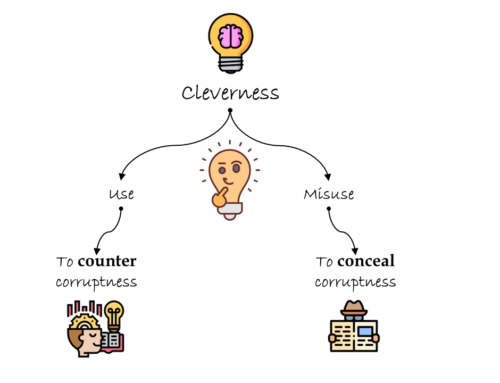“That was such a situation – anyone would have succumbed to the temptation.” By thus pointing our fingers at the circumstances, we often try to excuse our moral lapses.
However, what creates immorality is not the opportunity, but the mentality. Consider for example lust, which is arguably one of the greatest temptations and one of the strongest causes of immorality. It is the lusty mentality that makes us see the tempting situation as an opportunity for enjoyment. If we didn’t have a lusty mentality, we would see the situation differently, not as an opportunity for enjoyment but as a test – a test of our determination to put spirit above matter, to choose Krishna instead of the world. Put positively, a less lusty, more enlightened disposition would enable us to see the tempting situation as a different kind of opportunity – an opportunity to demonstrate our faith in Krishna, to show him that we believe his promise that the higher spiritual happiness he offers us through devotional service is greater and better than the sensual pleasure available through indulging in lust.
The Bhagavad-gita (03.40) states that lust is situated within – in the senses, the mind and the intelligence. This implies that we can’t blame externals. As long as we pass the buck to external situations – situations that are frequently beyond our power to change, we deprive ourselves of the opportunity to taste the peace and pleasure waiting for those who purify themselves of lust.
Gita wisdom helps us to place the buck where it belongs. That’s why the succeeding Gita verses place the responsibility to curb and conquer lust on us: to curb lust by regulating the senses (03.41), thereby minimizing exposure to triggering stimuli; and to conquer lust by situating ourselves on the spiritual platform (03.43), thereby relishing the supreme happiness of pure devotional love.
Bhagavad Gita Chapter 03 Text 40
"The senses, the mind and the intelligence are the sitting places of this lust. Through them lust covers the real knowledge of the living entity and bewilders him."


thanks alot
thank you pr ji for this very high level article . lust is one of the anarthas. Senses , mind and intelligence cannot be stopped but definately can be controlled. withdraw like a tortoise and for mind , one can perform sakshi bhava, witnessing the thoughts , without reacting to them.
Hare Krishna Prabhuji,
Excellent article. Make so much sense. Thank you very much more this in depth knowledge. Every time I read Gita Daily I feel like I am getting closer to Krishna.
Thank you,
Kiran